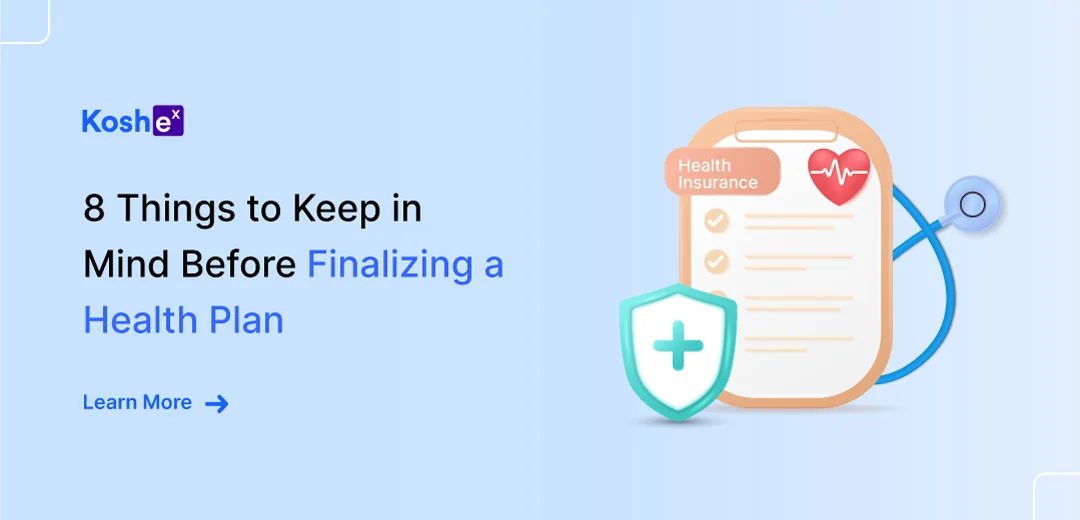Things To Keep In Mind Before Finalizing Health Plan
Health insurance has become one of the essential parts of our lives, especially after the pandemic. Most Indians react out for life insurance policies to help them build a sizable corpus and save taxes. But in recent times, more and more people are buying health insurance policies to protect themselves and their families. Health insurance plans help you during medical emergencies and prevent hospital bills from burning a massive hole in your pocket.
India’s health insurance industry is growing every year. According to Mordor Intelligence, in the fiscal year 2021, nearly 514 million people in India were covered by health insurance schemes.
The majority of these people were covered by government-sponsored health insurance plans, while the minority were covered by individual insurance plans, added the report.
The report also said that India’s Health and Medical Insurance Market is expected to achieve a CAGR of 8% during 2023 – 2028. This shows how more people are opting for health insurance and how it has become an essential part of everyone’s lives.
In this blog, we are going to be talking about the eight things you need to keep in mind before you finalize your health insurance plan.
Before you choose to invest in any investment instrument, you are told to consider your risk tolerance, investment horizon, and financial goals. In the same way, you should decide on certain things before you choose the right insurance policy for yourself and your family.
For instance, some people want a high-deductible health insurance plan. This means, the higher your deductible, the lower your monthly premiums. The reason behind this is you will have to pay more out-of-pocket expenses before your insurer starts covering them.
Meanwhile, some people would like to have an affordable monthly premium. There are several factors involved when determining what an affordable monthly premium is, including how much an individual earns, and their specific needs. and so on. Some may only want certain types of coverage, while others need comprehensive coverage.
Hence, it is a good idea to figure out the basics. You need to know how much coverage you need, how much you are willing to pay for the premium and what type of coverage would you like to have. On top of that, you should also consider the below eight factors before zeroing in on a health insurance plan.
1. Type Of Coverage
It is essential to understand that healthcare insurance is a broad term and you need to know the small differences between each policy. Some conventional policies will need co-payment, meaning the insurer will not bear 100% of the bill and you would have to pay some portion of the bill.
Apart from that, there could be maximum limits on room rent, ambulance charges, medicine, pre-hospitalization expenses, post-hospitalization expenses, etc. So, before you choose a health insurance policy for yourself, find out what kind of coverage it offers to avoid surprises later.
2. Sum Assured Or Insured
Sum Assured defines the amount that is assured to the policyholder irrespective of expense incurred. This helps cover even incidental expenses that may not be directly related to hospitalization. Let’s take an example to understand this further.
Mr. A is diagnosed with a minor cancer condition at the age of 55. He has a health insurance plan, which has a policy term of 25 years, and offers a sum assured of ₹30 lakhs. He will get a lumpsum amount of ₹7.5 lakhs irrespective of the expense incurred. All future premiums for this policy will be waived thereafter.
If Mr. A is diagnosed again with cancer when he is 58, he will receive ₹22.5 lakhs and the policy would terminate. These kinds of policies are pocket-friendly because you can opt for an “increasing cover option” wherein your Sum Assured would increase year on year with a very nominal increase in premium. This option beats the climbing costs of health care treatment because of inflation.
3. Hospital Network
Before you choose a health insurance policy, check whether the hospital in your nearby area is available on the list of networks or not. Hospitals in the network of the health insurance company offer cashless claim settlement facilities. This makes the claim settlement process convenient in the case of network hospitals. If it is a non-network hospital, the bill has to be paid by you and then it will be reimbursed by the insurance company upon submission of documents.
4. Specific Treatments & Diseases
Medical insurance plans list some specific illnesses and treatments for which coverage is available after a specified duration. For example, in many plans, coverage for piles, fistula, hernia, etc. is available only after the first 2 policy years. These illnesses are called specific diseases. Read your health insurance policy carefully to see which diseases are covered by it.
5. Getting A Plan At The Earliest
Most health insurance plans have an age limit as the main criterion. Usually, the upper age limit is 65 after which you won’t be able to open a new health insurance plan. So, make sure you get a health plan as early as possible. When you begin early, it could significantly lower your medical expenses overall.
6. Pre & Post-Hospitalization Charges
Pre and post-hospitalization include any tests, treatment, doctor visits, etc. conducted before or after the hospitalization. Different insurance companies have different terms and conditions regarding pre and post-hospitalization. So, when choosing a health insurance plan, you should understand what pre and post-hospitalization charges are covered by it. Without this coverage, you could be left with high medical bills. Also, check into the emergency care coverage during a period when you may need medical attention outside of your regular doctor visits due to an illness or injury.
7. Claim Process
After hospitalization, you need to claim and receive reimbursements from the insurance company. Choose those health insurance companies that process claims swiftly and have a high settlement ratio. A hassle-free claim process will ensure that there is no hassle involved while filing a claim or waiting for someone else to tell you what needs to be done. This will help your claim to be processed correctly and swiftly.
8. Your Current Health Condition & Needs
Before you finalize a health insurance policy for yourself, understand your current health conditions and what kind of needs would you like to be covered by your policy. If you have any conditions that you wish to be managed with medication or treatment, make sure these things are covered under the plan’s coverage. Also, if you have a pre-existing medical condition, find out whether the insurance company will cover it. Most times, you cannot change your policies’ features or terms until you renew them a year or so later. So, make sure you read everything carefully before choosing a policy.
In The End…
Health insurance policies are a must for a peaceful life and everyone should take one to protect themselves. You can also include your family in your policy so that they can get full coverage as well. During unexpected medical emergencies, health plans can help you get the best care, without burning a massive hole in your pocket.
With the rising inflation and increasing costs of healthcare, having a health insurance plan is a must for everyone. We hope this blog helped you understand the major things that you should consider before buying a health plan for yourself and your family.
If you wish to learn about other topics such as Mutual Funds, Fixed Deposits, tax-savings investments, goal-based investing, and more, head over to our Blog section. You can also create an account with Koshex to streamline your finances, invest in personalized recommendations, save in smart saving options, and step up your financial journey.
We are truly made for every Indian investor. So, download our app today!









Leave a Comment